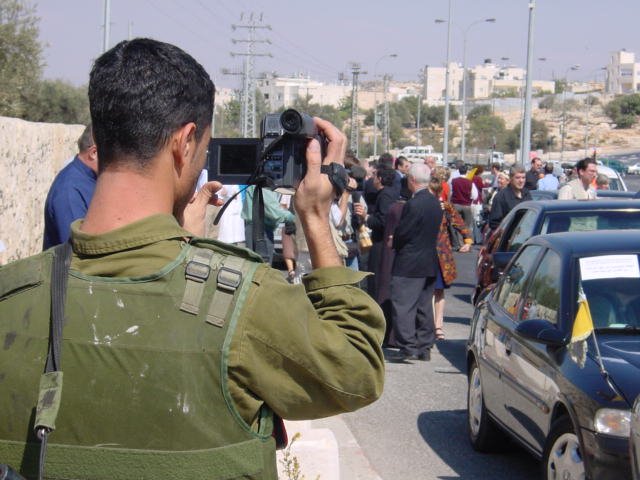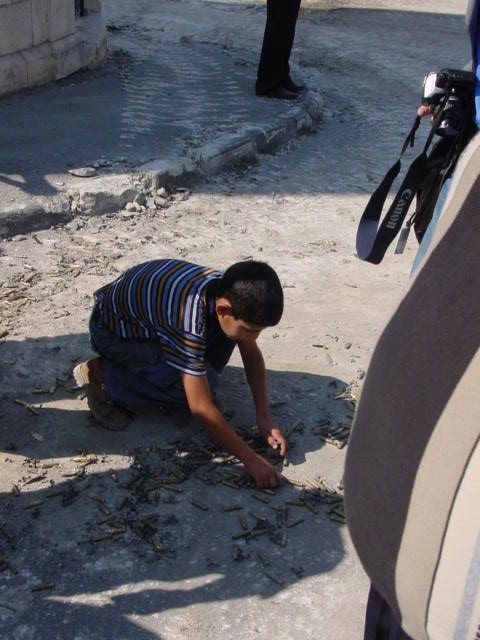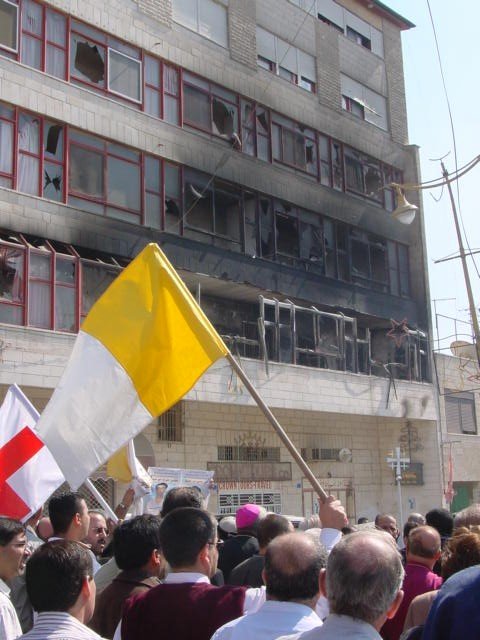October 23, 2001
We made it. We left Zababdeh at 6:30. The first two checkpoints were a cursory check at best. The third was fairly thorough, but surprisingly quick - only half an hour. One of the soldiers had scrawled in English on his army jacket, "F*** the world." Somehow appropriate.
An Israeli soldier capturing the peace march on video.
We made it to Jerusalem by 9:00 and headed off to meet up with friends at the Tantur checkpoint. All of the churches were represented - Orthodox, Catholic, Protestant - as well as a Muslim cleric and several Jewish peace activists. The major news' folks were there, including ABC, BBC, CNN, Al-Jazeera, as well as print media. An Israeli soldier was capturing it all on video tape - not sure why.
A child gathering up souvenirs from the many spent casings littering the streets of Bethlehem.
We entered by the thousands, meeting up with friends from Bethlehem on the other side - they had been pinned down in their houses for the last three or four days. It was good to see friends, both internationals and students from Zababdeh, and we're sure it was good to be seen! One of our friends from the Jewish peace camp was there - we asked him about the mood in Israel these days, particularly in the wake of Zeevi's assassination. He said that, in general, the Israeli people want peace. But they're not prepared to disassemble the Apartheid regime which now exists in order to do it. A discouraging time for all.
The procession heads past some of Bethlehem’s devastation.
The procession headed along the main road by Rachel's Tomb (the first time in a year that this road has been open to any but soldiers and Jewish worshippers). As we walked, a young boy picked up a handful of rocks, ready to throw. He was scolded by the men in the crowd and he relented - the closest we came to any semblance of violence in the demonstration. We headed along roads littered with spent live ammunition, the burned out shell of the Paradise Hotel (this time in the midst of renovations after the first Israeli fire hit it a year ago), church bells pealing their welcome as we walked.
The multifaith coalition of clerics, gathering to call for peace.
By the time we made it to the Church of the Nativity, we were 5000 strong. At the worship service, leaders of many different churches spoke, including the Roman Catholic, Greek Orthodox, Armenian, and Anglican churches - as well as the Muslim cleric. From there we drove to the Latin Seminary in Beit Jala. The members of several grieving Christian families were there, and we greeted them. Among them was the family of Rania, a twenty-two year old mother of two, buried in her wedding dress.
Marthame with a few of our students who are spending the year at the Latin Seminary in Beit Jala.
We also met up with three of our old students from the School in Zababdeh who are studying at the seminary in grade eight this year. They were thrilled to see us and gave us letters to pass along to their families. They also impressed us with their additional English skills added this year; their French teacher seems to have improved their French, too.
We also met an Israeli writer whose work we have come to know over the last year. He has been one of the braver voices to come out of the Israeli peace camp - a Russian Jew who immigrated to Israeli in the 1960s, his idea of the solution is: "One Man, One Vote." It sometimes sounds like a pipe-dream for this place, but it's probably the only viable solution. Which means it will be avoided at all costs.
We went from there to Al-Aida Refugee Camp, but didn't stay long - shooting soon broke out, which meant it was time to go home. We escaped by car through the now-empty streets of Bethlehem and back to Jerusalem. For some reason, we went to bed early, a little weary from the day perhaps?





